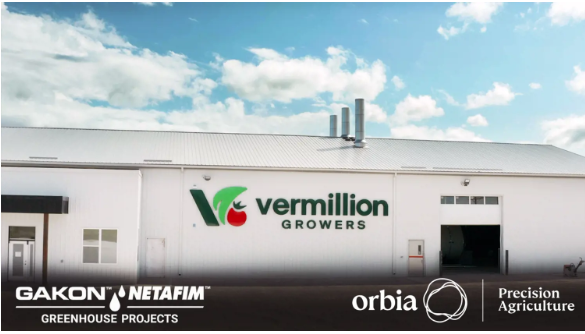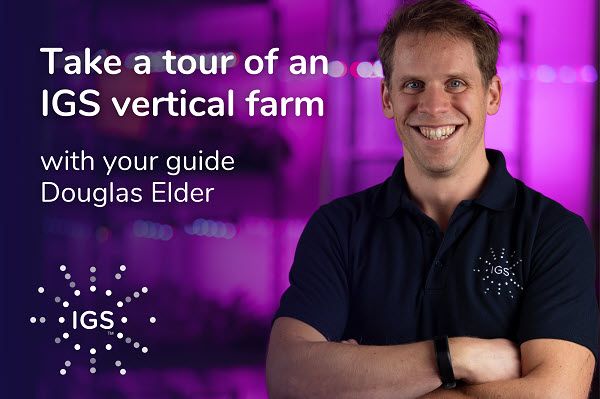Netafim Partners with Vermillion Growers to Open State-of-the-Art Commercial Greenhouse In Central Canada
Orbia’s Precision Agriculture business, Netafim (Indoor Ag-Con 2024 Exhibitor!) has partnered with Vermillion Growers to build a large-scale vegetable greenhouse in Manitoba, Canada. Gakon Netafim, the company’s commercial greenhouse project division, is a world-renowned leader in Controlled Environment Agriculture (CEA). The facility celebrated its grand opening on July 27, 2023, a significant milestone for Orbia, Vermillion Growers, and the local community.
Based in Dauphin, Vermillion Growers will begin growing tomatoes year-round across 10 acres, with plans to expand their production area and grow additional crops. Canada currently imports over 75% of its vegetables and 50% of its tomatoes. By reducing shipping time, customers can get fresh, higher-quality tomatoes at their local grocery stores, even in remote communities. By reducing transit time and the resulting spoilage, this exciting new development also cuts down on food waste.
Orbia Precision Agriculture Technology to Support Sustainable Practices
Gakon Netafim’s greenhouse solutions make it possible, and profitable, to meet consumers’ preferences for local produce that is grown sustainably.
The roof structure on the greenhouse will collect enough water to meet 50% of the entire facility’s irrigation needs. Additionally, the double-screen system minimizes light pollution and reduces the overall energy used by 50%. “The double-screen technology is optimal for controlling the climate in the greenhouse and allows for greater energy savings and efficiency,” says Ricky Elz, Greenhouse Key Account Project Manager at Gakon Netafim. “The blackout screens provide shading to crops and are essential to crop growth in the greenhouse.”
“Our partnership with Vermillion Growers is an exciting part of our Greenhouse Business and I’m excited for what comes next. All of us at Orbia are proud to play a role in positively impacting the many communities of Manitoba,” said Claude Corcos, Vice President of Strategy & Business Development at Orbia’s Precision Agriculture business, Netafim USA.
Economic Benefits and Community Impact
Since Vermillion Growers’ opening, it has hired 30 new full-time employees and will eventually bring over 200 jobs to the community. Vermillion has further partnered with Assiniboine Community College, a local college in Dauphin which will begin offering a Horticultural Production program this fall to provide education and training to those in the community who are interested in pursuing work in the field, including work at Vermillion Growers.
Notably, Vermillion Growers has provided job training and support to several workers who relocated from Ukraine to escape from conflict. Per Capita, Dauphin has one of the largest Ukrainian populations in Canada.
“The combination of world-class greenhouse technology and local expertise is why Vermillion invested in Gakon Netafim solutions,” says Maria Deschauer, managing director of Vermillion Growers. “We prioritize growing fresh produce, as well as healthy people and sustainable communities. All three are connected and we are thrilled for their support.”
About Netafim
Netafim, Orbia’s Precision Agriculture business, is the world’s largest irrigation company and a global leader in precision agriculture solutions committed to fight scarcity of food, water and land, for a sustainable future. Founded in 1965, Netafim pioneered the drip revolution, creating a paradigm shift toward precision irrigation. Today, specializing in end-to-end solutions from the water source to the root zone, Netafim delivers irrigation and greenhouse projects, as well as landscape and mining irrigation solutions supported by engineering, project management and financing services. Netafim is also leading the way in digital farming, irrigation and fertigation, integrating real-time monitoring, analysis and automated control into one state-of-the-art system. With 33 subsidiaries, 19 manufacturing plants, 2 recycling plants and more than 5000 employees worldwide, Netafim delivers innovative, tailor-made irrigation and fertigation solutions to millions of farmers, allowing smallholders to large-scale agricultural producers and investors, in over 110 countries, to grow more with less™.
About Orbia
Orbia is a company driven by a shared purpose: to advance life around the world. Orbia operates in the Polymer Solutions (Vestolit and Alphagary), Building and Infrastructure (Wavin), Precision Agriculture (Netafim), Connectivity Solutions (Dura-Line) and Fluorinated Solutions (Koura) sectors. The five Orbia business groups have a collective focus on expanding access to health and wellness, reinventing the future of cities and homes, ensuring food and water security, connecting communities to information and accelerating a circular economy with basic and advanced materials, specialty products and innovative solutions. Orbia has commercial activities in more than 110 countries and operations in over 50, with global headquarters in Boston, Mexico City, Amsterdam and Tel Aviv.
About Vermillion Growers
Vermillion Growers is the first large-scale vegetable greenhouse in Manitoba, Canada. Its mission is to grow high-quality produce, healthy people, and sustainable communities. The greenhouse is helping to bridge the gap in food production in Central Canada by producing fresh tomatoes year-round. Vermillion Growers utilizes industry-leading technology to operate an efficient and environmentally sustainable facility.


 Adam Greenberg
Adam Greenberg with, it’s easy for things to fall through the cracks. Forecasting presents an even bigger challenge that oftentimes ends up as a combination of best guesses and constant fine-tuning. During planning, issuing a single change order can take up to a week as the team works though that excel document. We aim to solve all these challenges with the clarity that comes from a quantifiable, data-driven process that takes the guesswork out of growing.
with, it’s easy for things to fall through the cracks. Forecasting presents an even bigger challenge that oftentimes ends up as a combination of best guesses and constant fine-tuning. During planning, issuing a single change order can take up to a week as the team works though that excel document. We aim to solve all these challenges with the clarity that comes from a quantifiable, data-driven process that takes the guesswork out of growing. LUNA is a SaaS model where clients make recurring payments. As the camera vision captures images while riding around the greenhouse/indoor farm, it sends those images to LUNA’s data collection point where it is translated onto an app the grower can access on a cellphone or laptop. There are multiple pixels per millimeter and each photo and every single pixel is collected and analyzed. That leads to recurring costs and ongoing analysis. The more passes the camera makes, the costs are adjusted accordingly. Each customer — and each order iUNU gets from these customers — is unique. The iUNU team essentially acts as a semi-autonomous horticultural consultant as we recommend the number of passes needed to meet a grower’s goals and needs. This can range from a single daily pass for a grower seeking to find problems with chlorosis or mildew up to 8-10 passes a day for that grower who is a voracious consumer of data.
LUNA is a SaaS model where clients make recurring payments. As the camera vision captures images while riding around the greenhouse/indoor farm, it sends those images to LUNA’s data collection point where it is translated onto an app the grower can access on a cellphone or laptop. There are multiple pixels per millimeter and each photo and every single pixel is collected and analyzed. That leads to recurring costs and ongoing analysis. The more passes the camera makes, the costs are adjusted accordingly. Each customer — and each order iUNU gets from these customers — is unique. The iUNU team essentially acts as a semi-autonomous horticultural consultant as we recommend the number of passes needed to meet a grower’s goals and needs. This can range from a single daily pass for a grower seeking to find problems with chlorosis or mildew up to 8-10 passes a day for that grower who is a voracious consumer of data.